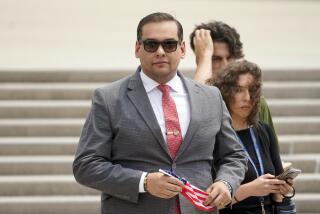Rostenkowski Pleads Not Guilty to Corruption Charges : Court: House lawmaker vows to ‘wash away the mud’ from his reputation. His attorney says he will launch a constitutional attack on allegations.
- Share via
WASHINGTON — Rep. Dan Rostenkowski pleaded not guilty Friday to 17 felony corruption charges and left U.S. District Court here vowing to “wash away the mud that has been splattered on my reputation.”
Inside the federal courthouse--where cases from the Watergate scandal of the Richard Nixon era to the Iran-Contra scandal of the Ronald Reagan Administration have been tried--the Illinois Democrat said little, leaving it to his newly retained attorney, Dan K. Webb to declare: “On behalf of the defendant, we enter a plea of not guilty to each and every count of the indictment.”
Webb, the former U.S. attorney in Chicago, made clear that he will launch a constitutional attack on what he branded a “kitchen sink” of charges. He contended that the executive branch was infringing on congressional duties by trying to decide which of Rostenkowski’s expenditures were for official purposes.
In an indictment returned by a federal grand jury on May 31, Rostenkowski is accused of charges ranging from accepting kickbacks of government funds from a son-in-law to buying cars for his family with public and campaign money. He also is accused of using government wages to pay 14 employees who did little or no official work and performed such personal chores as mowing the lawn at his summer home and photographing the wedding of one of his daughters.
In addition, the grand jury charged that the congressman used postage vouchers to steal cash from Congress, purchased gifts for friends and supporters with government funds and, in what appeared to be the most insidious of the accusations, tampered with a federal witness.
Reading from a written statement to reporters in the glare of a late afternoon sun, Rostenkowski said: “Some ask: ‘How could I have done these things?’ The answer is simple. I didn’t do them. Talk is cheap and allegations come easily. In court, they will be subjected to a higher standard. . . . They will fail the test and I will be vindicated.”
During a 14-minute court session, U.S. District Judge Norma H. Johnson said that Rostenkowski could remain free on his personal recognizance on one condition imposed by the government: that he not discuss the case with anyone who might become a witness. Asked whether he agreed to the condition, Rostenkowski replied in an uncharacteristically soft voice: “I do.”
That condition presumably resulted from the count of the indictment that accuses Rostenkowski of instructing an employee not to reveal certain information to the grand jury.
The judge set no date for the trial, which Webb estimated would last six weeks. Rostenkowski was neither fingerprinted nor photographed before or after the arraignment. But Herbert Rutherford, U.S. marshal for the District of Columbia, said that delaying those procedures was “not that unusual.”
Webb brushed aside questions about whether constitutional challenges would delay the trial, saying: “If I file a constitutional motion and I win, it doesn’t necessarily delay anything. I win. The case is dismissed. The congressman is exonerated of all wrongdoing.”
Webb contended that virtually all the charges are based on the allegation that Rostenkowski “spent congressional money for purposes that were not official in nature.”
“Who determines whether or not certain expenditures are official? The Constitution says it has to be determined by Congress,” Webb said. “In fact, this indictment is an effort by the executive (branch) to define official duties. By so doing, they have violated a number of provisions of the U.S. Constitution.”
If Webb decides to mount constitutional challenges to the indictment, the trial could be delayed until next year--well beyond congressional consideration of President Clinton’s health care plan. As chairman of the Ways and Means Committee, Rostenkowski would have played a major role in that process. But because of the indictment he was forced to step down from the chairmanship.
While saying that he agrees with U.S. Atty. Eric H. Holder Jr. that the case should go to trial “as rapidly as possible,” Webb added that he had “absolutely no intention of relinquishing any of the congressman’s constitutional rights.”
When a reporter urged Rostenkowski to answer the indictment’s allegation that he used congressional funds to pay a godson to mow his vacation house lawn, Webb instead stepped in saying: “Let me address that,” and switched the question to “so-called ghost payrollers.”
Evidence at trial, he contended, will show there were no ghosts. Instead, they were “people who worked and performed services,” Webb said. “Who’s going to define the word official?”
The lawyer contended that congressional staff members are specifically authorized by law to perform personal services on their off-hours if they choose to do so.
The statute of limitations has run out on nine of the 14 ghost workers cited by the indictment, Webb said.
Rostenkowski filed a financial disclosure statement Friday on Capitol Hill showing that he has collected more than $750,000 for his legal defense fund from lobbyists and friends.
The legal war chest, established last August at a time when he was under federal investigation but still in control of the Ways and Means Committee, included $5,000 donations from the Tobacco Institute, the Metropolitan Life Insurance Co., the Anheuser-Busch political action committee and Federal Express, the report showed.
New York real estate magnate Donald Trump gave $5,000, as did Jerry Reinsdorf, owner of the Chicago Bulls basketball team and the White Sox baseball club. Jack Valenti, Washington representative for the motion picture industry, gave $3,000.
The report showed other contributions from AT&T;, General Electric, universities, steel companies and the banking and securities industries.
More to Read
Get the L.A. Times Politics newsletter
Deeply reported insights into legislation, politics and policy from Sacramento, Washington and beyond. In your inbox three times per week.
You may occasionally receive promotional content from the Los Angeles Times.










